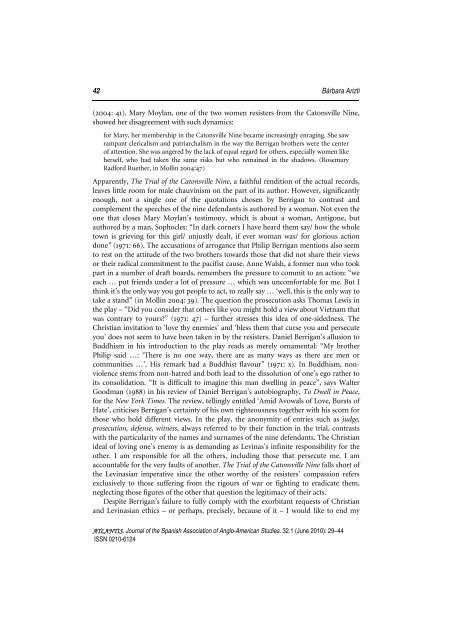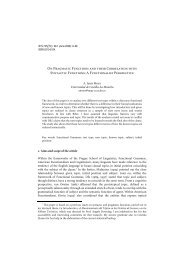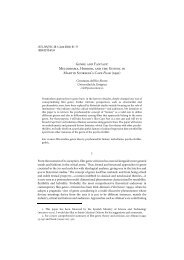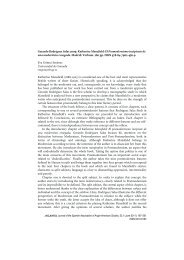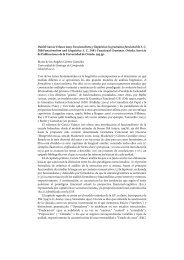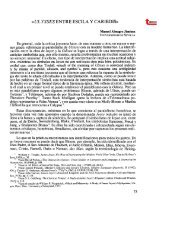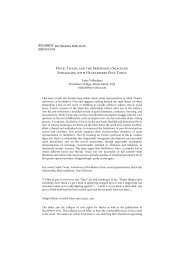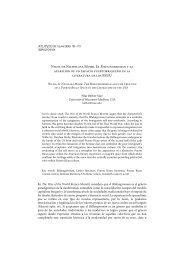Revista de la Asociación Española de Estudios Anglo - Atlantis
Revista de la Asociación Española de Estudios Anglo - Atlantis
Revista de la Asociación Española de Estudios Anglo - Atlantis
Create successful ePaper yourself
Turn your PDF publications into a flip-book with our unique Google optimized e-Paper software.
42 Bárbara Arizti<br />
(2004: 41). Mary Moy<strong>la</strong>n, one of the two women resisters from the Catonsville Nine,<br />
showed her disagreement with such dynamics:<br />
for Mary, her membership in the Catonsville Nine became increasingly enraging. She saw<br />
rampant clericalism and patriarchalism in the way the Berrigan brothers were the center<br />
of attention. She was angered by the <strong>la</strong>ck of equal regard for others, especially women like<br />
herself, who had taken the same risks but who remained in the shadows. (Rosemary<br />
Radford Ruether, in Mollin 2004:47)<br />
Apparently, The Trial of the Catonsville Nine, a faithful rendition of the actual records,<br />
leaves little room for male chauvinism on the part of its author. However, significantly<br />
enough, not a single one of the quotations chosen by Berrigan to contrast and<br />
complement the speeches of the nine <strong>de</strong>fendants is authored by a woman. Not even the<br />
one that closes Mary Moy<strong>la</strong>n’s testimony, which is about a woman, Antigone, but<br />
authored by a man, Sophocles: “In dark corners I have heard them say/ how the whole<br />
town is grieving for this girl/ unjustly <strong>de</strong>alt, if ever woman was/ for glorious action<br />
done” (1971: 66). The accusations of arrogance that Philip Berrigan mentions also seem<br />
to rest on the attitu<strong>de</strong> of the two brothers towards those that did not share their views<br />
or their radical commitment to the pacifist cause. Anne Walsh, a former nun who took<br />
part in a number of draft boards, remembers the pressure to commit to an action: “we<br />
each … put friends un<strong>de</strong>r a lot of pressure … which was uncomfortable for me. But I<br />
think it’s the only way you got people to act, to really say … ‘well, this is the only way to<br />
take a stand” (in Mollin 2004: 39). The question the prosecution asks Thomas Lewis in<br />
the p<strong>la</strong>y – “Did you consi<strong>de</strong>r that others like you might hold a view about Vietnam that<br />
was contrary to yours?” (1971: 47) – further stresses this i<strong>de</strong>a of one-si<strong>de</strong>dness. The<br />
Christian invitation to ‘love thy enemies’ and ‘bless them that curse you and persecute<br />
you’ does not seem to have been taken in by the resisters. Daniel Berrigan’s allusion to<br />
Buddhism in his introduction to the p<strong>la</strong>y reads as merely ornamental: “My brother<br />
Philip said …: ‘There is no one way, there are as many ways as there are men or<br />
communities …’. His remark had a Buddhist f<strong>la</strong>vour” (1971: x). In Buddhism, nonviolence<br />
stems from non-hatred and both lead to the dissolution of one’s ego rather to<br />
its consolidation. “It is difficult to imagine this man dwelling in peace”, says Walter<br />
Goodman (1988) in his review of Daniel Berrigan’s autobiography, To Dwell in Peace,<br />
for the New York Times. The review, tellingly entitled ‘Amid Avowals of Love, Bursts of<br />
Hate’, criticises Berrigan’s certainty of his own righteousness together with his scorn for<br />
those who hold different views. In the p<strong>la</strong>y, the anonymity of entries such as judge,<br />
prosecution, <strong>de</strong>fense, witness, always referred to by their function in the trial, contrasts<br />
with the particu<strong>la</strong>rity of the names and surnames of the nine <strong>de</strong>fendants. The Christian<br />
i<strong>de</strong>al of loving one’s enemy is as <strong>de</strong>manding as Levinas’s infinite responsibility for the<br />
other. I am responsible for all the others, including those that persecute me. I am<br />
accountable for the very faults of another. The Trial of the Catonsville Nine falls short of<br />
the Levinasian imperative since the other worthy of the resisters’ compassion refers<br />
exclusively to those suffering from the rigours of war or fighting to eradicate them,<br />
neglecting those figures of the other that question the legitimacy of their acts.<br />
Despite Berrigan’s failure to fully comply with the exorbitant requests of Christian<br />
and Levinasian ethics – or perhaps, precisely, because of it – I would like to end my<br />
ATLANTIS. Journal of the Spanish Association of <strong>Anglo</strong>-American Studies. 32.1 (June 2010): 29–44<br />
ISSN 0210-6124


